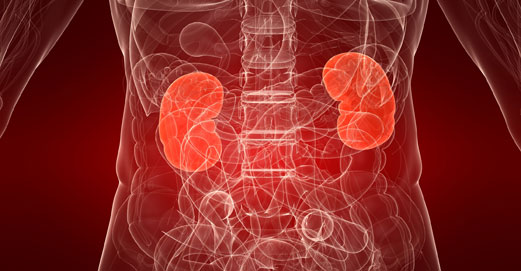


Treatment for Kidney failure with Stem Cell Therapy
The primary function of the kidney is to remove excess water and waste from the body. Acute kidney failure occurs when the kidneys are suddenly unable to remove waste and concentrate urine without the loss of electrolytes. Chronic kidney failure is the gradual loss of kidney function over time.
The causes of kidney damage can include acute tubular necrosis, a kidney disorder, autoimmune kidney diseases, extremely low blood pressure, clotting disorders of the blood vessels in the kidneys, certain infections that affect the kidney including septicemia, pregnancy complications and urinary tract obstruction.
There are many possible kidney failure symptoms: bloody stools, bruising easily, bad breath, mood changes, reduced appetite, fatigue, hand tremors, decreased sensation, flank pain, high blood pressure, nosebleeds, nausea, vomiting, metallic taste in the mouth, seizures, fluid retention, bleeding longer than usual, persistent hiccups and urination changes
New Stem Cell Therapy to Treat Kidney Failure
Adult stem cells are undifferentiated and can morph into the cells of countless tissues, organs and structures within our bodies. Used in many treatments, they restore damaged fibers and rejuvenate impaired cells through cell division, a process in which they multiply indefinitely. Stem cell science has seen much progress in recent years with many new discoveries being made
COPD Treatment with Stem Cell Therapy
COPD, or chronic obstructive pulmonary disease, is a very common lung disease. It causes difficulty in breathing and there are two main forms of it, chronic bronchitis, which is characterized by a long-term cough with mucus, and emphysema, which is the destruction of the lungs over a long period of time. The majority of COPD sufferers have a combination of these conditions.
The main cause of COPD is smoking. The longer someone smokes, the more likely they are to develop COPD. Nonsmokers can get emphysema if they lack the alpha-1 antitrypsin protein, but this is rare.
Risk factors for COPD also include the frequent use of cooking gas without proper ventilation, exposure to particular workplace fumes, pollution and secondhand smoke.
COPD symptoms include shortness of breath, a cough with mucus, recurring respiratory infections, fatigue and wheezing. As the symptoms of COPD develop quite slowly many people are unaware that they are in any way sick.
